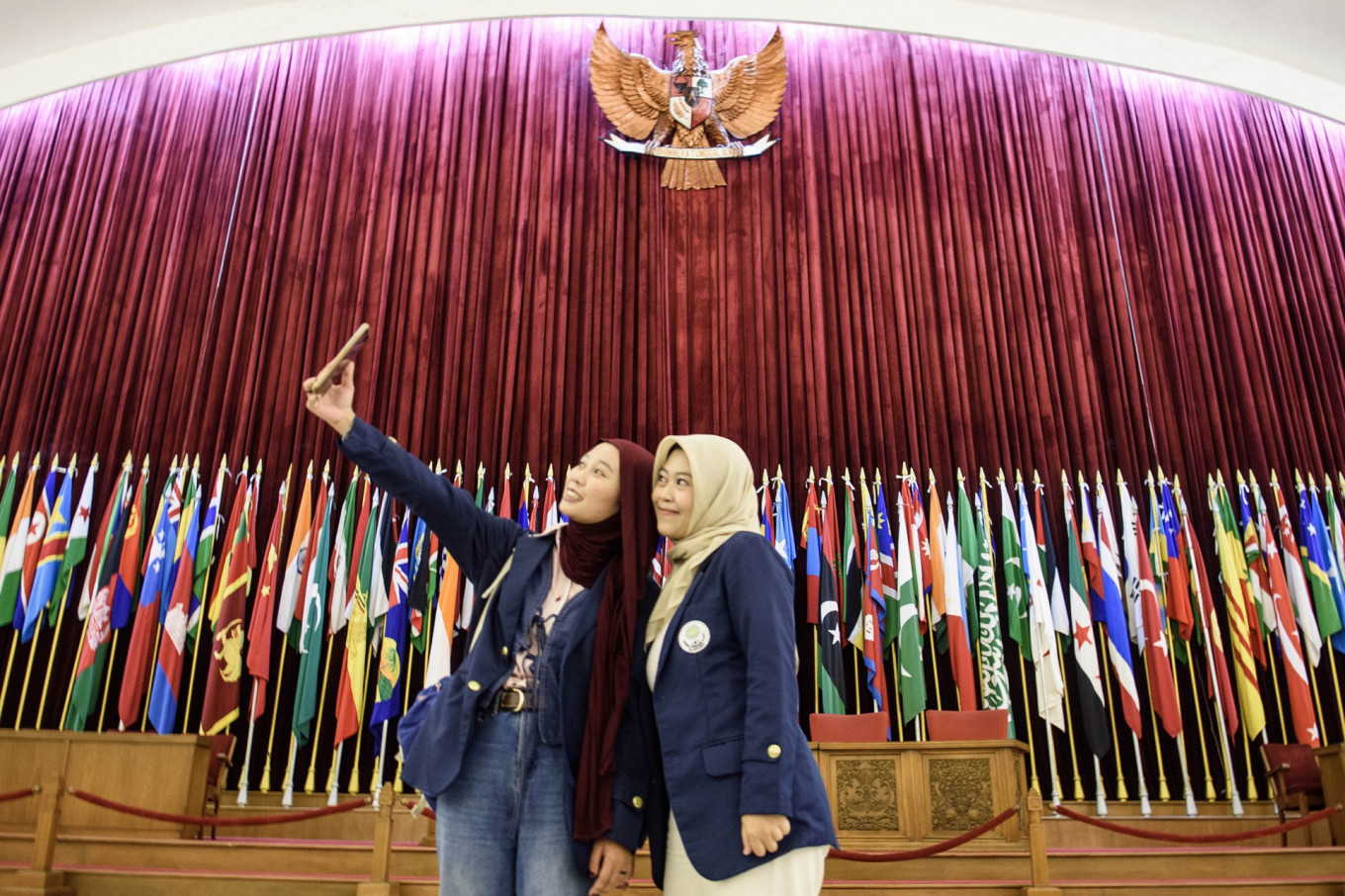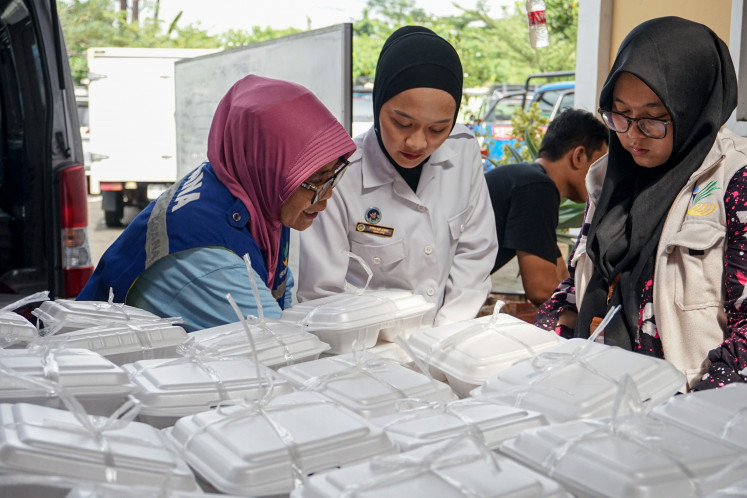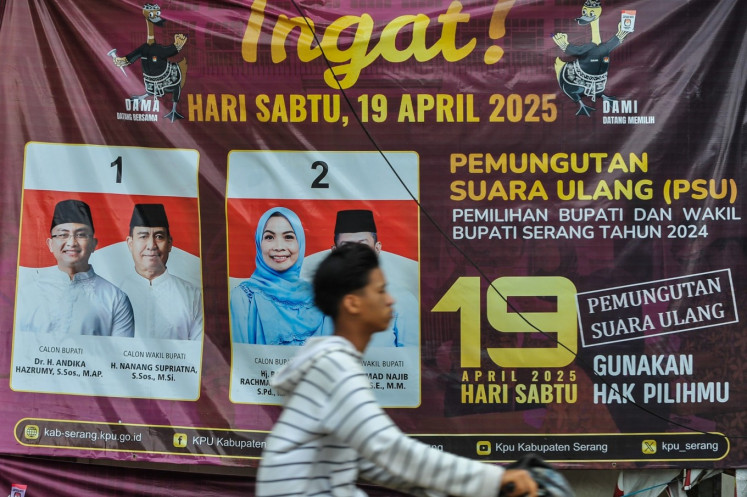Popular Reads
Top Results
Can't find what you're looking for?
View all search resultsPopular Reads
Top Results
Can't find what you're looking for?
View all search resultsBeyond nostalgia: Bandung Spirit and the fight for human rights today
The Bandung Spirit calls for a more democratic and inclusive interpretation, one shaped by the voices, histories and lived realities of the Global South.
Change text size
Gift Premium Articles
to Anyone
 Reviving historic vision: Visitors take a selfie in front of Asian and African countries' flags on April 16 at the main hall of the Merdeka Building in Bandung, West Java. The building was the venue for the 1955 Asia-Africa Conference, also known as the Bandung Conference, where 29 Asian and African countries convened in the spirit of anti-colonialism. (Antara/Novrian Arbi)
Reviving historic vision: Visitors take a selfie in front of Asian and African countries' flags on April 16 at the main hall of the Merdeka Building in Bandung, West Java. The building was the venue for the 1955 Asia-Africa Conference, also known as the Bandung Conference, where 29 Asian and African countries convened in the spirit of anti-colonialism. (Antara/Novrian Arbi)
S
eventy years ago this month, the world witnessed a historic assertion of post-colonial agency. In April 1955, leaders from 29 newly independent Asian and African nations gathered in Bandung, West Java, to declare that the future would no longer be dictated by colonial empires, but on solidarity, justice and dignity.
Some Southeast Asian states stood at the center of this vision, such as Indonesia, which led the call for racial equality and anti-imperialist unity, and Myanmar (then Burma), which emerged as a principled voice articulating the values that became the Bandung Spirit: Non-alignment, anti-colonialism and peaceful coexistence.
The 1955 Asian-African Conference was the first major political expression of unity among formerly colonized nations. Its outcome, the Bandung Principles, were grounded in lived experiences of oppression and offered a transformative way of understanding human rights.
The Bandung Conference did not reject human rights’ universality but demanded their decolonization. For the Bandung delegates, colonialism was itself the ultimate violation of human rights. Political independence was only the beginning. The real struggle was against the ongoing legacies of exploitation, cultural erasure and structural inequality.
Bandung challenged the dominant Western conception of human rights as solely individual legal entitlements; abstract principles often removed from historical and social realities. In its place, the conference advanced a more holistic and inclusive vision, grounded in the lived experiences of colonized peoples. It affirmed that human rights must encompass not only civil and political freedoms but also economic justice, cultural identity and the right to resist oppression.
At the core of this vision was the right to self-determination. The conference’s final communiqué underscored a simple but profound truth: Human rights cannot thrive under foreign domination or economic dependence. This was more than a political statement, it was a powerful indictment of a global order that cloaked inequality in the language of progress.
Bandung also took an unequivocal stand against racial discrimination. It aligned itself with global struggles against apartheid and white supremacy, condemning racism as both a grave violation of human rights and a deliberate mechanism of control. It recognized the deep entanglement of race, power and dignity in shaping the post-colonial world.
Yet, Bandung was not without its shortcomings. Women’s rights received only brief mention. Though there were references to gender equality in education, work and marriage, the discourse remained largely male-dominated. The deeper structural injustices faced by women were largely ignored.
Still, Bandung planted the seeds for future feminist movements that would connect the struggle for gender justice with broader battles against colonialism, capitalism and patriarchy. The conference also exposed a tension that continues to shape human rights discourse today: The friction between universal ideals and cultural or historical specificity.
While delegates affirmed the United Nations Charter and the Universal Declaration of Human Rights, they did so with careful skepticism. Their concern lay not with the principles themselves, but with two concerns. First was with the body issuing the framework that was perceived as representing Western control and domination, and second by how the instruments were often applied selectively; serving geopolitical interests while overlooking the enduring legacies of empire.
But Bandung did not reject human rights. It reimagined them. It called for a more democratic and inclusive interpretation, one shaped by the voices, histories and lived realities of the Global South. This vision of universality, grounded in historical truth, cultural diversity and equal participation, remains as urgent and necessary today as it was then.
The Bandung Spirit echoed through the formation of the Non-Aligned Movement and later influenced key regional frameworks such as the African Charter on Human and Peoples’ Rights, adopted in 1981. However, this spirit of human rights did not find explicit expression in the founding documents of ASEAN.
When ASEAN was established in 1967 through the Bangkok Declaration, there was no direct mention of human rights. Instead, the declaration focused on accelerating economic growth, social progress and cultural development, regional peace and stability and the principles of the UN Charter. It was not until 2007, four decades later, that human rights were formally recognized in ASEAN’s foundational legal framework, through their inclusion in the ASEAN Charter.
The human rights debates sparked at Bandung echoed decades later in the 1993 Bangkok Declaration toward the World Conference on Human Rights in Vienna that reaffirmed indivisibility of rights and the need for cultural and contextual understanding.
Today, across Asia and Africa, deep-rooted inequalities endure. Authoritarianism, poverty and repression continue to silence millions, especially women, children, indigenous peoples and human rights defenders. Dissent is criminalized, opposition suppressed and elections reduced to hollow performances stripped of democratic substance. In a cruel turn of history, many states that once resisted colonial domination now mirror its injustices.
For instance, in Myanmar, the military junta continues its brutal campaign against its people, bombing villages, displacing entire communities and using hunger as a weapon of war. In Palestine, people are subjected to systemic violence, occupation and apartheid, denied their fundamental rights and dispossessed of their land.
This is not merely a regional crisis; it is a global reckoning. The international human rights framework, which Bandung helped inspire, is under siege. Worse still, its language is being co-opted by authoritarian regimes that invoke sovereignty to repress dissent and evade accountability.
This is the central contradiction: States that once defied imperial domination now reproduce its logic.
The Bandung Spirit must not be reduced to nostalgia. It must live on as a call to action; a demand to reclaim human rights from the margins, not by rejecting their universality, but by anchoring them in the lived realities of those long silenced and sidelined.
The promise of Bandung was not merely symbolic. It was a vision of a global human rights movement built on justice, solidarity and true inclusivity. That promise remains unfinished. It is ours to renew.
***
The writer is executive director of ASEAN Parliamentarians for Human Rights (APHR).










